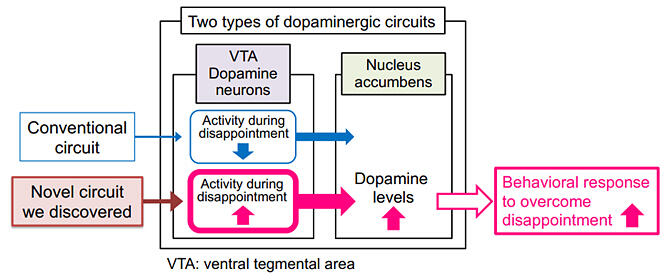Humans strive to achieve goals that are higher than their current status quo, even if we encounter "disappointment" along the way. Animals also depend on their ability to overcome disappointments in their foraging and courtship behaviors to survive and thrive. Traditionally, the release of dopamine in the brain, which is important for motivation, was believed to increase when things go better than expected and decrease when expectations are not met. However, the ability to overcome disappointment has not yet been explained.
Hypothesizing the existence of dopaminergic neurons whose activity increases in response to disappointment, Associate Professor Masaaki Ogawa and his research group at the Graduate School of Medicine of Kyoto University trained rats to actively seek a probabilistic reward and measured the activity of their dopamine neurons. They found that even in "disappointing" situations, where the expected reward was not received, the rats switched their behavior to focus on the next reward, and dopamine neurons that increased their activity were detected in such situations. It was also found that dopamine release increases in the nucleus accumbens, the projection site for dopamine neurons, immediately after disappointment. Moreover, they found that artificially stimulating the dopaminergic circuit projecting to the nucleus accumbens at the moment of disappointment increased the behavior focusing on the next reward.
This research has clarified a new role for dopamine and produced revolutionary results that have changed conventional wisdom about neural mechanisms that support motivation. In the future, this may contribute to the understanding and development of treatments for psychiatric and neurological disorders, such as depression and addiction, which cause abnormalities in motivation.

Journal Information
Publication: Science Advances
Title: Dopamine error signal to actively cope with lack of expected reward
DOI: 10.1126/sciadv.ade5420




